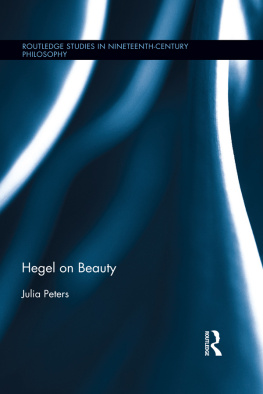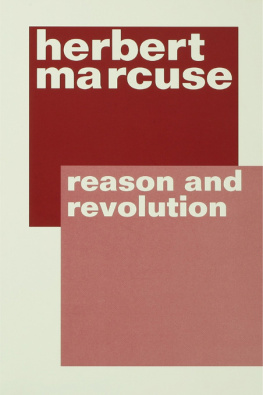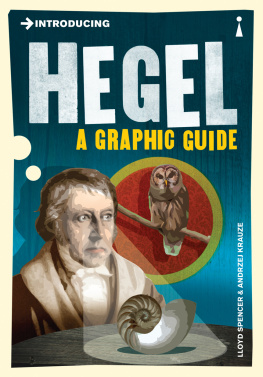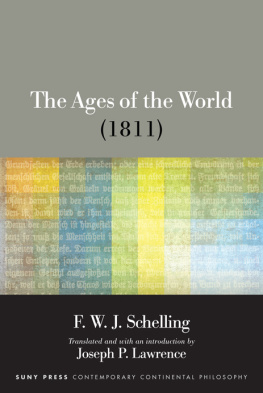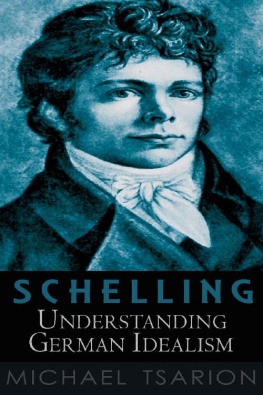Lauer Christopher. - The Suspension of Reason in Hegel and Schelling
Here you can read online Lauer Christopher. - The Suspension of Reason in Hegel and Schelling full text of the book (entire story) in english for free. Download pdf and epub, get meaning, cover and reviews about this ebook. year: 2019, publisher: Bloomsbury UK, genre: Science. Description of the work, (preface) as well as reviews are available. Best literature library LitArk.com created for fans of good reading and offers a wide selection of genres:
Romance novel
Science fiction
Adventure
Detective
Science
History
Home and family
Prose
Art
Politics
Computer
Non-fiction
Religion
Business
Children
Humor
Choose a favorite category and find really read worthwhile books. Enjoy immersion in the world of imagination, feel the emotions of the characters or learn something new for yourself, make an fascinating discovery.

- Book:The Suspension of Reason in Hegel and Schelling
- Author:
- Publisher:Bloomsbury UK
- Genre:
- Year:2019
- Rating:4 / 5
- Favourites:Add to favourites
- Your mark:
- 80
- 1
- 2
- 3
- 4
- 5
The Suspension of Reason in Hegel and Schelling: summary, description and annotation
We offer to read an annotation, description, summary or preface (depends on what the author of the book "The Suspension of Reason in Hegel and Schelling" wrote himself). If you haven't found the necessary information about the book — write in the comments, we will try to find it.
The Suspension of Reason in Hegel and Schelling — read online for free the complete book (whole text) full work
Below is the text of the book, divided by pages. System saving the place of the last page read, allows you to conveniently read the book "The Suspension of Reason in Hegel and Schelling" online for free, without having to search again every time where you left off. Put a bookmark, and you can go to the page where you finished reading at any time.
Font size:
Interval:
Bookmark:
The Suspension of Reason in Hegel and Schelling
Continuum Studies in Philosophy
Series Editor: James Fieser, University of Tennessee at Martin, USA
Continuum Studies in Philosophy is a major monograph series from Continuum. The series features first-class scholarly research monographs across the whole field of philosophy. Each work makes a major contribution to the field of philosophical research.
Aesthetic in Kant, James Kirwan
Analytic Philosophy: The History of an Illusion, Aaron Preston
Aquinas and the Ship of Theseus, Christopher Brown
Augustine and Roman Virtue, Brian Harding
The Challenge of Relativism, Patrick Phillips
Demands of Taste in Kants Aesthetics, Brent Kalar
Descartes and the Metaphysics of Human Nature, Justin Skirry
Descartes Theory of Ideas, David Clemenson
Dialectic of Romanticism, Peter Murphy and David Roberts
Duns Scotus and the Problem of Universals, Todd Bates
Hegels Philosophy of Language, Jim Vernon
Hegels Philosophy of Right, David James
Hegels Theory of Recognition, Sybol S. C. Anderson
The History of Intentionality, Ryan Hickerson
Kierkegaard, Metaphysics and Political Theory, Alison Assiter
Kierkegaards Analysis of Radical Evil, David A. Roberts
Leibniz Re-interpreted, Lloyd Strickland
Metaphysics and the End of Philosophy, H. O. Mounce
Nietzsche and the Greeks, Dale Wilkerson
Origins of Analytic Philosophy, Delbert Reed
Philosophy of Miracles, David Corner
Platonism, Music and the Listeners Share, Christopher Norris
Poppers Theory of Science, Carlos Garcia
Role of God in Spinozas Metaphysics, Sherry Deveaux
Rousseau and the Ethics of Virtue, James Delaney
Rousseaus Theory of Freedom, Matthew Simpson
Spinoza and the Stoics, Firmin DeBrabander
Spinozas Radical Cartesian Mind, Tammy Nyden-Bullock
St. Augustine and the Theory of Just War, John Mark Mattox
St. Augustine of Hippo, R. W. Dyson
Thomas Aquinas & John Duns Scotus, Alex Hall
Tolerance and the Ethical Life, Andrew Fiala
Christopher Lauer

Continuum International Publishing Group
The Tower Building | 80 Maiden Lane |
11 York Road | Suite 704 |
London SE1 7NX | New York, NY 10038 |
www.continuumbooks.com
Christopher Lauer 2010
All rights reserved. No part of this publication may be reproduced or transmitted in any form or by any means, electronic or mechanical, including photocopying, recording, or any information storage or retrieval system, without prior permission in writing from the publishers.
British Library Cataloguing-in-Publication Data
A catalogue record for this book is available from the British Library.
eISBN-13: 978-1-4411-1588-1
Library of Congress Cataloging-in-Publication Data
A catalog record for this book is available from the Library of Congress.
Typeset by Newgen Imaging Systems Pvt Ltd, Chennai, India
Printed and bound in Great Britain by the MPG Books Group
For all my teachers, past and present.
Over the past five or six years, Americans have heard an increasing number of calls, as Derrida put it, to save the honor of reason. luminaries from Al Gore to Pope Benedict XVI have presented faith in reason as a necessary bulwark against a battery of brute expressions of will whose only justification is a relativistic indifference to providing reasons. It is all well and good to question our most deeply shared assumptions, the defense of reason typically runs, but this does not justify abandoning the carefully wrought standards by which we have learned over the millennia to distinguish compelling from specious arguments. While this defense has a provenance at least as old as Socratess answer to Callicles in the Gorgias, the alternatingly plaintive and apocalyptic tone in which Gore et al. make it suggests that more is at stake than a weariness of rational defeatism. After seeing so many political and legal institutions crumble at the hands of both malicious neglect and active dismantling, the defenders of reasons honor have grown increasingly frantic in their efforts to reconstruct the reasons behind these institutions.
These defenses typically (and wisely) decline their opponents disingenuous entreaties to provide a definition of reason or to specify with finality how one can distinguish reason from unreason. Instead, they assume that reason carries with it the whole of human experience and cannot be analyzed into any series of rules. If it could, it would be a product of what the German idealists called the intellect or understanding (Verstand), which is defined precisely by its ability to draw connections based upon concrete rules. Such assurances will surely be unsatisfying to those who believe that each persons reason is nothing but an idiosyncratic collection of prejudices and habits of thought, but the paralyzing force of this skepticism is for the misologist can feel an exquisite pleasure in coupling reminders of the modern worlds loss of reason with the bare hint of the operation of a transpersonal reason.
But such suspicions can also come from reason itself. As Immanuel Kant so eloquently observes in the preface to the first edition of the Critique of Pure Reason, the impulse to retrace the reason(s) behind decaying institutions is nothing but the impulse of self-criticism, which inevitably turns back on itself (A xii). To the extent that such calls to and for reason demand that everything submit to critique, they cannot assume that reason is simply given, but must continually question their own justification. For Johann Gottlieb Fichte, this called for reasons endless striving for self-justification and self-grounding, the very sound of which was already too exhausting for some readers to absorb. Two of the most impassioned of these readers were G. W. F. Hegel and F. W. J. Schelling, one-time seminary roommates and later professional collaborators who came of age intellectually during the waning years of Kants productive life and grew to appreciate both the achievements of human reason and the need for its suspension (Aufhebung). Frustrated by what Hegel would later dismiss as the ages near-universal idle, indeterminate chatter about reason (H 20: 192, 181), both devoted substantial quantities of time and ink to working out exactly what it would mean to distinguish a general faculty of reason from a rule-bound understanding and then to showing how even this more general sort of intelligence is capable of steering us wrong. In a generation raised on both the promise of perennial Foucauldian critique and the disillusion of the American rights appropriation of philosophical relativism, I suspect that many will find their nuanced approach at least attractive, and perhaps even timely, and it is the thesis of this book that despite the variations of its formulations, there is also truth to be found in Schelling and Hegels conception of a suspension of reason.
To frame my discussion of reason (Vernunft) in the early writings of Schelling and Hegel in terms of its suspension (
Next pageFont size:
Interval:
Bookmark:
Similar books «The Suspension of Reason in Hegel and Schelling»
Look at similar books to The Suspension of Reason in Hegel and Schelling. We have selected literature similar in name and meaning in the hope of providing readers with more options to find new, interesting, not yet read works.
Discussion, reviews of the book The Suspension of Reason in Hegel and Schelling and just readers' own opinions. Leave your comments, write what you think about the work, its meaning or the main characters. Specify what exactly you liked and what you didn't like, and why you think so.



